When the end is already decided, what is the point of our actions?
Chloe Benjamin’s novel "The Immortal" tells a story that begins with a suspenseful setting: four young children who accidentally receive a witch’s prophecy and learn the exact date of their future death, thereby altering each of their life choices. It is a common topic of discussion – is there still room for our free will when the outcome is already decided?
Nowadays, in order to increase the freedom of play, many games will set up many dialogue and behavior options, and every choice of the player may affect the direction and ending of the following plot. In order to experience different plots, many players will play with other behavior choices after clearing the level, and finally after the first week, the second week, or even the third week, experience all the life possibilities of the game protagonist, or play a perfect ending. In some games with relatively delicate plot settings, this game mode allows you to fully experience what is called the "butterfly effect" in life. For example, in "Life is Strange", even a detail the size of a ball of waste paper will have a huge impact in the later stage of the game. On the other hand, the limitations of the game itself also make us understand that no matter how rich and free choices we make, the final outcome cannot be separated from the end point provided by the game developers. It seems that a game is like a simple beta version of life. But even crueler than the game is that we cannot experience the second or third week of life, yet every subtle choice we make does have unpredictable effects in reality, and no matter what life choices we make, we cannot escape the end of life: death. Many times, in reality, because death exists in unknown ways and restricts some of our behavior, we will not rush into the battlefield with weapons as easily as in the game, or to drive a motorcycle on the roof and fly across the road. We know that these actions are likely to lead to final results. But if we already know the exact moment of the end of death, then these constraints may be lifted by crazy thoughts.
The American writer Chloe Benjamin tried to use the novel "The Eternal" to tell such a story about fate and choice. This kind of story has been quite extensive in ancient Greek tragedies, but the difference is that in ancient Greek tragedies, the oracle of fate is relatively vague, it hides a lot of necessary information. For example, Oedipus received the oracle that he would kill his father and marry his mother, but did not know that the parents he thought were not his biological parents. "The Eternal" as a modern novel makes the prophecy more clear.
The novel begins in 1969 – a sensitive year for human civilization, and one that reflects the author’s ambitions. The main characters in the story are four siblings in the family, Varia, the oldest, Daniel, the second, Clara, who is nine, and Simon, the youngest. After several children learn that a mysterious witch lives in Hearst Street and can predict the exact date of each person’s death, they decide to secretly try it, which inadvertently changes their lives. It also makes us wonder how death – as a necessary consequence of life – affects the course of life.
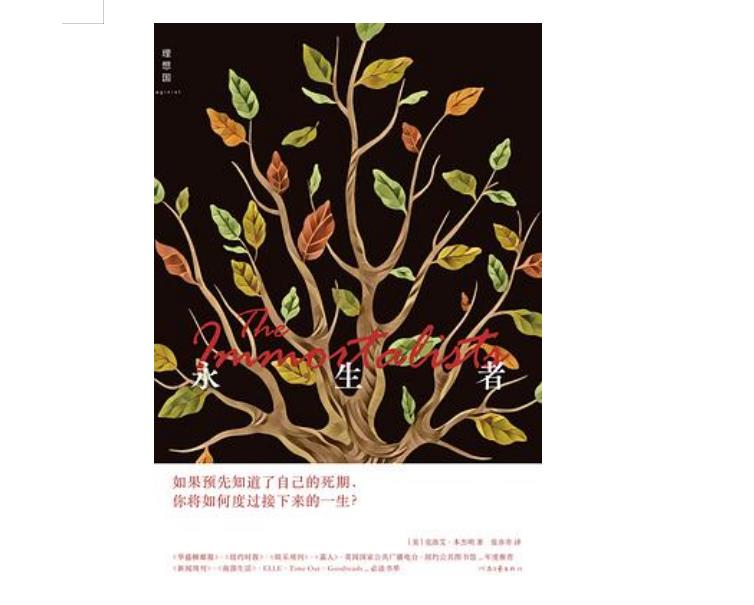
"The Immortal", Author: (US) Chloe Benjamin, Translator: Zhang Yifei, Version: Utopia | Henan Literature and Art Publishing House, October 2022
If I die tomorrow
The four siblings who receive the death prophecy present four different ways of facing life – in this novel, the difference is mainly determined by the length of the rest of their lives. The most interesting of these are Simon and Daniel.
Simon, the youngest, seemed to have his soul replaced on the way home after hearing the prophecy from the witch. Simon, who was once quiet, contradicted his family at the dinner table that night and shouted "I’m happy!", even though "he was a little uncomfortable playing this role". Because of the four siblings, Simon was the youngest, but the date of death was the latest – he could only live to 20 years old. Although several children came home and said that the witch was pure nonsense, the death prophecy still affected their survival to varying degrees.
Realizing that he only had thirteen years left to live, Simon suddenly underwent a personality change. In short, he no longer tolerated it. He used to worry that his parents would find out that he was actually gay. He knew that his brothers and sisters were going away and he needed to stay to take care of his parents and the family business. But in the face of his imminent death, Simon felt that he urgently needed to burst out of his true self in the remaining life. Therefore, he chose a long journey away from home similar to running away, and put all the concerns mentioned before behind him.
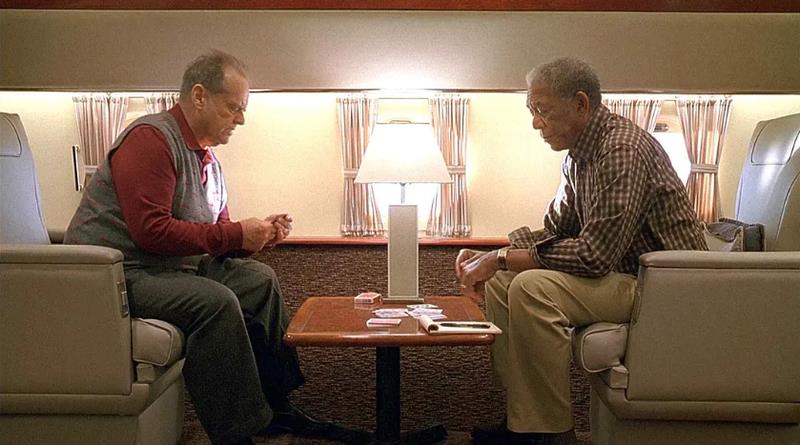
"Bucket List" stills.
Simon started his "bucket list" in San Francisco. He danced in nightclubs, studied at the San Francisco Ballet Academy, slept with other men, "In New York, he would live for them, but in San Francisco, he could live for himself. And, though he didn’t want to think about it, even though he had been pathologically avoiding the topic, he now allowed himself to think about it: What if the woman on Hearst Street was right? This thought changed the color of his life. It made everything urgent, sparkling, and precious." Eventually, after a few years of this life in San Francisco, Simon contracted AIDS, which had not been named and recognized at that time, due to promiscuity, and died on the date predicted by the witch.
Daniel, the second brother, was the third of the four to die. After the death of Simon and Clara’s relatives, Daniel was extremely remorseful and hated for the prophecy given by the witch of the year, and he must find the witch in Hearst Street. With the cooperation of a police friend, Daniel found the witch’s house and asked her if she had predicted that today was the witch’s own death. The police friend who arrived in time only wanted to shoot the thigh to stop Daniel from killing the witch. Unexpectedly, the shot through the thigh shattered the aorta in the leg, causing Daniel to bleed to death. Therefore, Daniel also died on the day the witch predicted.
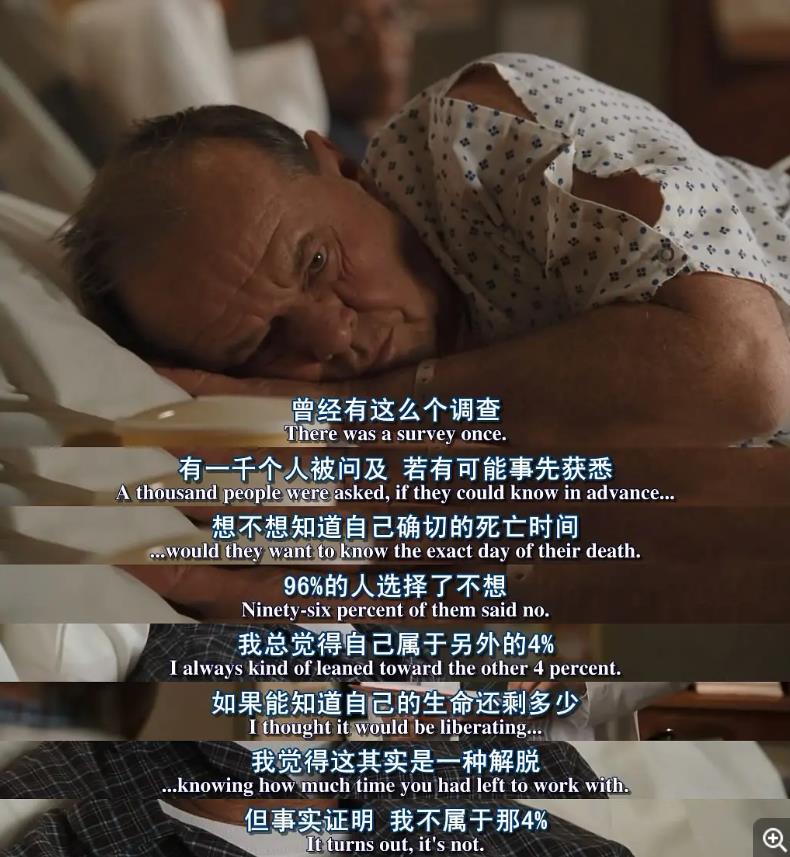
Stills from the movie "Bucket List".
Daniel’s death, by contrast, is more like an oracle in an ancient Greek tragedy. Daniel, 48, did not completely forget his death prophecy. He had a regular medical examination, and each time the result proved that he was in good health – perhaps it was this that gave him overconfidence. He let go of almost all his vigilance until the night of the death prophecy date. He could hardly imagine any sudden accident that could take his life, but in the end he died in an even more unexpected situation.
Logically, both Simon and Daniel’s deaths were avoidable, but it seems that both of them ran to their own deaths more accurately in different ways of avoiding death. Simon’s choice was a responsive escape, and the date of death had taken root in his heart. No matter how much he denied it, he actually believed that he had heard the prophecy and was facing an unalterable destiny. He then spent the rest of his life counting down, and in this story, it can be said that if Simon had not run away from home and hung out with gays in San Francisco, he would have probably spent his twenty-first birthday at home unscathed from AIDS. The annual physical examination was similar to his trial process, trying to confirm the failure of the witch’s prophecy. At the same time, in 2006, at the end of Daniel’s chapter, he was also caught in the circle of the death of the first two relatives. He firmly believed that the witch’s prophecy did not come true on the last day of the day, which must mean that it has failed.
Simon finally dies in the convulsion of repeating "I love you" over and over to his lover Robert. He feels that there is nothing wrong with his life. The so-called regrets are left to the logic of fate itself. Unlike the movie "Bucket List" to fulfill the wish of life, Simon’s death is just a prophecy, not as certain as a terminal illness, and his life length is too short compared to the protagonist in the movie. In Simon, we can think of the predicted death date as an encouragement to move away from the image of a good child, to engage with the life experience that he has not dared to practice before, and to encourage a person to accept the death itself. As for Daniel, he has been inquiring about the witch’s residence, trying to find someone to be responsible for the death of his relatives. The most robust person in his body may be the one who is the least afraid to face death in his heart.
Two Ways to Accept Death
The two female characters, Clara and Varia, seem to approach death prophecies in a more natural way than the two men in the family. Clara was also told that she would die at the age of 31. She also went to San Francisco to become a magician, but performed a very dangerous "jaw of life" – but on the night of a performance in 1991, Clara chose to hang herself in her room.
In Clara’s world, "death" not only exists, but also means a real world. She does not resist death, and believes that there are things in this world that can transcend death, such as human souls and consciousness. She often dreams of Simon at night, and she thinks that if she can continue to have this connection with Simon or other deceased people, it means that consciousness can continue to exist even if the body dies, she can transcend boundaries, and death does not exist at all.
Clara’s idea is philosophical. Is there room for us humans to exercise free will when cause and effect have become inevitable? This is a philosophical question that has been debated for decades. In the seventeenth century, mechanism and determinism told almost everyone that everything has cause and effect, including freedom itself, which is part of the law of causation. Later, the philosopher David Hume, in order to overthrow causality, led people into the abyss of agnosticism – everything you see is unreliable. It’s a pity that there is no Humean thinker in the novel "The Eternal" to explain this way of life. Later, Kant and other philosophers began to discuss free will, and the final result was that philosophers succeeded in prying open a hole in the world of determinism and causal logic, proving that in some small crevices, human free will has an independent and free space. Unfortunately, the space for human exercise of free will is more like a powerful placebo most of the time. After all, the behavioral decisions we make out of free will cannot resist the laws of the physical world; the human mind can invent countless ideas that despise and transcend death, but death will come in time.
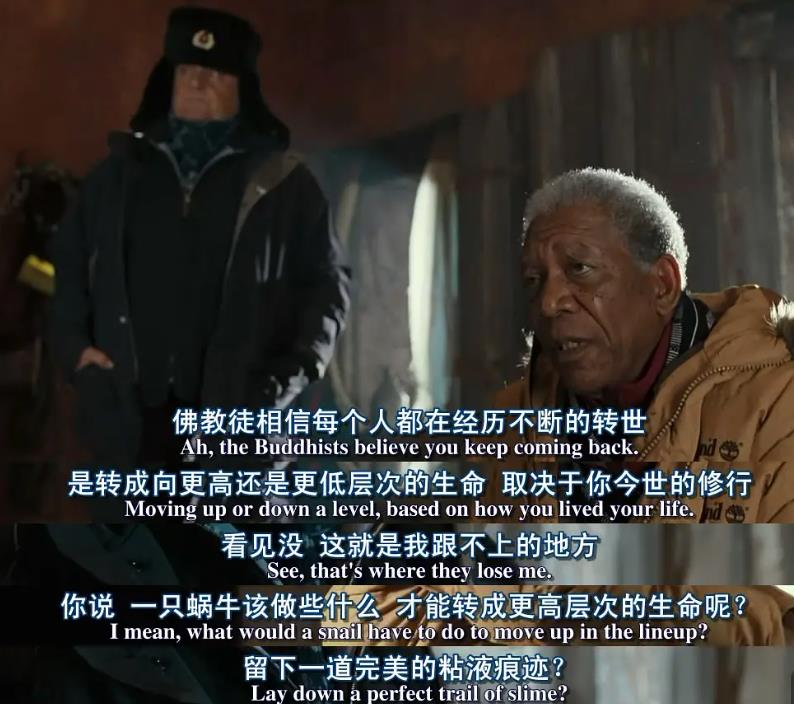
Stills from the movie "Bucket List".
Clara is such a person who stares at death. She thinks she is capable of being a bridge – crossing the living and the dead to become an "immortal". She completes what she calls the task of "communicating with the dead" in Scrabble with Simon, her star performance becomes a memory for the audience, and finally she chooses to commit suicide in the days predicted by the witches. Of the four siblings, Clara is the only one to enter death by freely choosing death.
In contrast, Varia, the eldest sister who lived to the end, was more like a person who completely ignored death. This may be related to the date she was predicted to live to 88 years old, and she looks no different from a normal person. She doesn’t need to worry about the arrival of death, she just needs to make her own life rhythm and plan, and wait quietly for that day to come. Unlike a normal person, she has one (or three) more opportunities to stare at death.
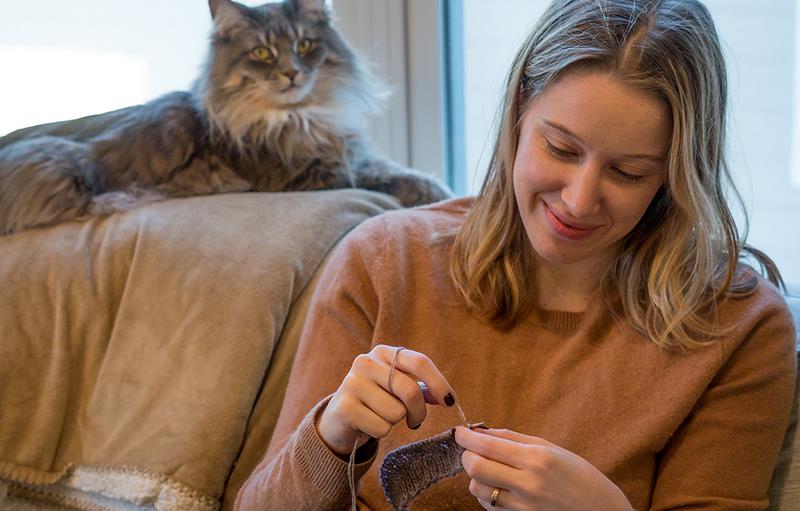
Chloe Benjamin.
"Varia and her siblings had a choice, an opportunity for self-reflection. They wanted to measure time, they wanted to plan and control time. But as they chased the future, they actually got closer to that woman’s prophecy."
Chloe Benjamin’s novel "The Immortal" involves a series of major events such as the AIDS crisis, 9/11, and racial issues in the narrative span of several decades, but these issues are all dissolved in the bond of four siblings. To his credit, he does not let death fail in the face of different attitudes towards life, but maintains the suspense element of the witch’s death prophecy. Under this premise, "The Immortal" offers us the opportunity to reflect on our attitude towards life – what matters is not whether our choices can change the outcome of life, what matters is that our choices will change the course of our journey towards the outcome, and that all choices have a price, and the acceptance of the price is often the part of the real value difference in different people’s hearts that is often overlooked.
Author/Miyako
Editor/Yuan Chunxi